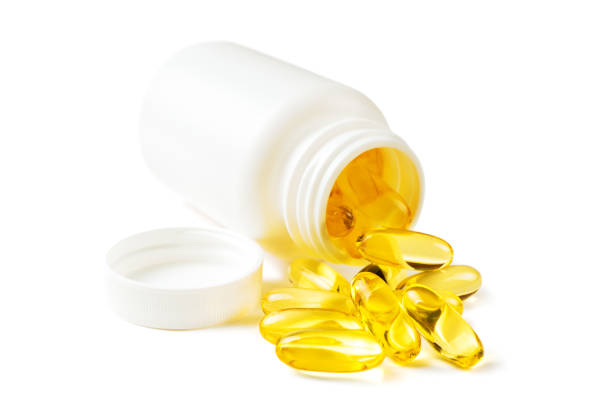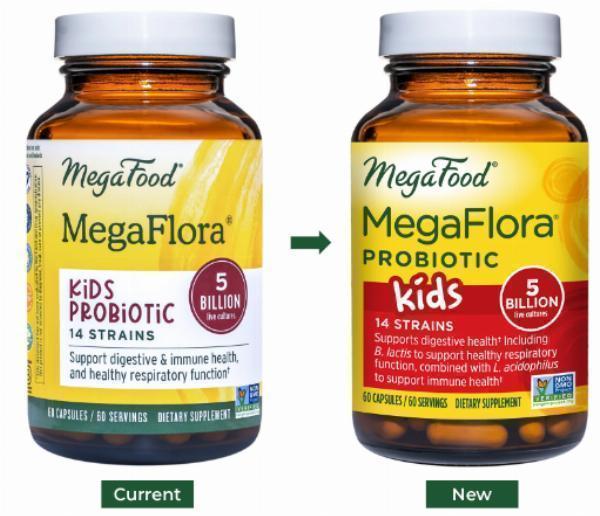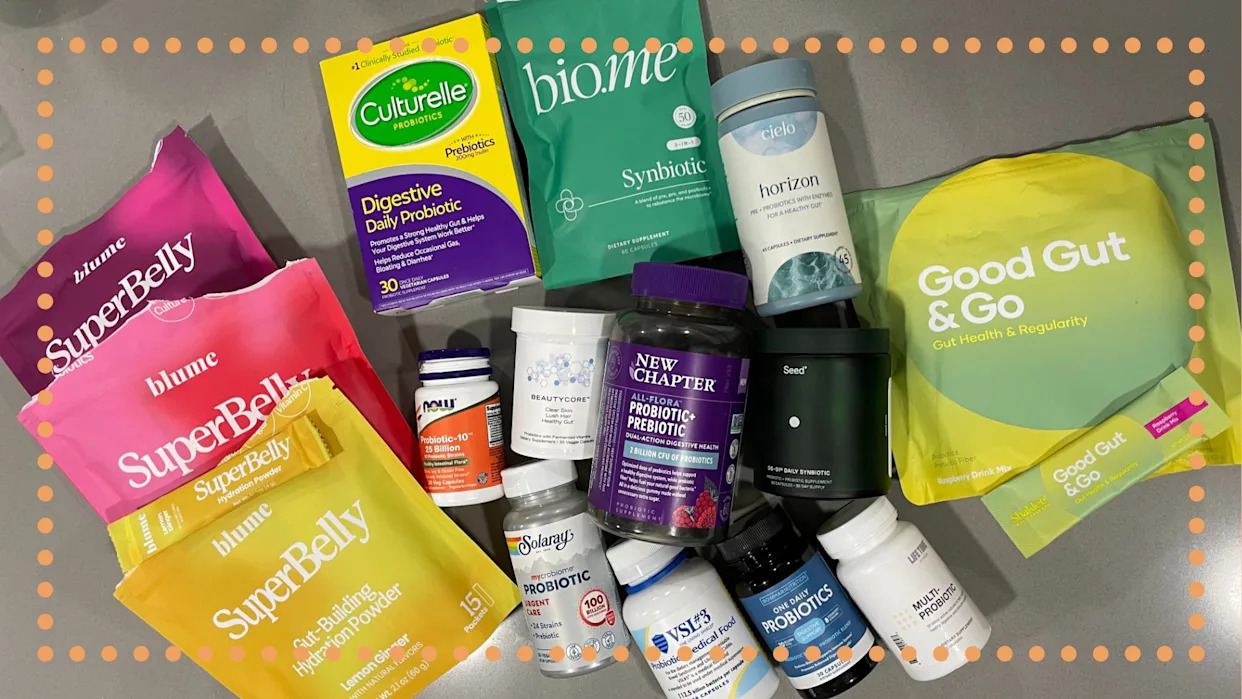
Your gut does so much more than digest food — it's the command center for your health. When your gut isn't happy, your immune system, digestion and even mood can take a hit. Don't get enough probiotics in your diet? The best probiotic supplement may be the secret weapon your gut's been craving. These microorganisms come packed with benefits, and with more than 5% of adults turning to probiotics in recent years, it's clear that gut health is at the top of many people's minds.
Quick Overview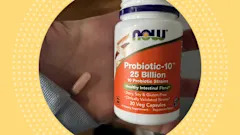
Best overall probiotic
Now Foods Probiotic-10
More options$8 for 30 capsules at Amazon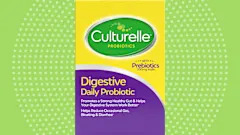
Best drugstore probiotic
Culturelle Digestive Daily Probiotic Capsules
More options$18 at Culturelle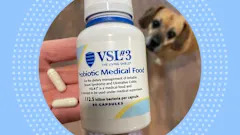
Best probiotic for IBS
VSL#3 Capsules
$66 at VSL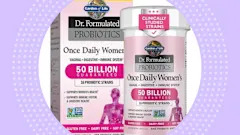
Best probiotic for women
Garden of Life Once Daily Dr. Formulated Probiotics for Women
More options$32 at Amazon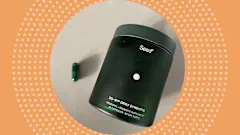
Best pre- and probiotic
Seed DS-01 Daily Synbiotic
More options$50 at SeedSee 2 moreProbiotics are live microorganisms best known for their role in gut health. While bacteria are the primary source of probiotics, certain types of yeasts are also included under this term. Although further research is needed, probiotics have been shown to offer a variety of health benefits. These include supporting gut health by addressing issues like constipation and diarrhea, boosting immune health and supporting weight management. They may even help protect against certain chronic conditions like heart disease.
Probiotics naturally occur in fermented foods like yogurt, kefir, miso paste, kimchi and sauerkraut. However, if you don't like the taste of these foods or don't eat them regularly, a probiotic supplement could be a convenient alternative.
AdvertisementAdvertisement#«R45ekkr8lb2m7nfblbH1» iframeRegistered dietitians agree that probiotic supplements are beneficial for certain individuals. Alyssa Smolen, a community and media dietitian, recommends them for clients who "have been on a heavy course of antibiotics, don't consume a ton of probiotic-rich foods or are having digestive issues." Similarly, Vicki Koenig, a dietitian at Nutrition-Wise, suggests probiotics for "specific gastrointestinal or liver issues." She also highlights research linking probiotics to potential benefits for diabetes, cholesterol management and GLP-1 hormone secretion, and calls it an exciting area of study.
The tricky part? There's an overwhelming number of probiotic supplements to choose from. And, because the benefits of probiotics are strain-specific, it's important to select a product that's formulated to address your health concerns. We consulted registered dietitians to understand the different types of probiotics and what to look for in a supplement. Using their expert insights, we researched the most popular probiotics on the market and put 15 to the test. Keep reading for our picks of the best probiotics for gut health.
Table of contents
Best overall probiotic
More probiotic supplements we like for 2025
Types of probiotic supplements
Factors to consider when purchasing probiotic supplements
How we chose the best probiotic supplements
Other products we tested
FAQs
Meet our experts
A note on supplements
AdvertisementAdvertisement#«R4bekkr8lb2m7nfblbH1» iframeThe products included on this list are dietary supplements. Statements about these products have not been evaluated by the Food and Drug Administration. These products are not intended to diagnose, treat, cure or prevent any disease. Dietary supplements are not appropriate for everyone and may interact with other supplements or medications, so talk to your health care provider before adding a dietary supplement to your routine.
Update, June 27, 2025: We checked all product prices and availability. Our No. 1 pick for best overall probiotic was updated. We also included additional testing data, adding one new product to the list and adding categories for "best for IBS" and "best for women." We also added FAQs on probiotics for men and probiotics to take with antibiotics.
Best overall probiotic
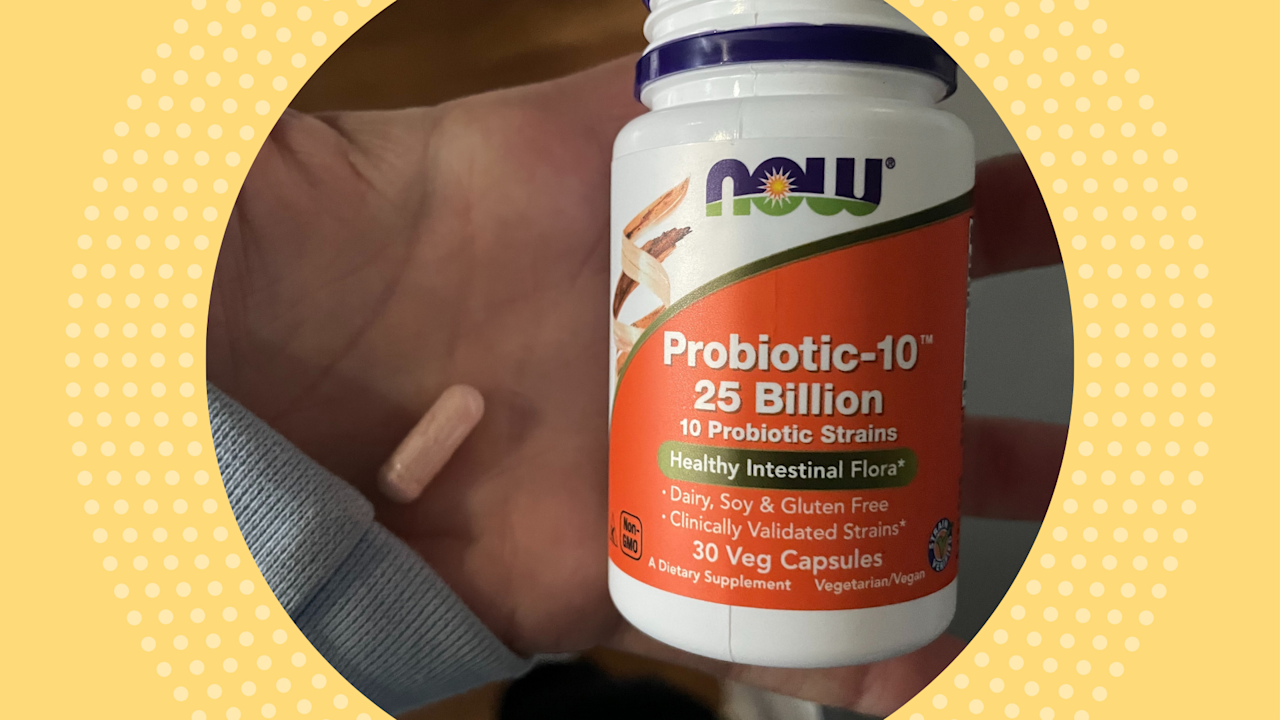
Alexandra Ginos, RD
Best overall probiotic
Now Foods Probiotic-10
Form: Capsule | Dose: 1 capsule | CFU count: 25 billion | Strains: Lactobacillus acidophilus, Bifidobacterium lactis, Lactobacillus plantarum, Lactobacillus casei, Lactobacillus rhamnosus, Lactobacillus paracasei, Bifidobacterium breve, Streptococcus thermophilus, Lactobacillus salivarius, Bifidobacterium longum
Now Foods Probiotic-10 supplement earned our pick as the best overall probiotic for general gut health thanks to its research-backed strains, affordable price point and shelf-stable formulation. We also like that it provides 25 billion colony-forming units (CFU) from 10 different probiotic strains packaged in a convenient one-capsule serving. While there are benefits of single-strain probiotics, multistrain products may offer a wider range of benefits and be a good option for general gut health.
Included in the lineup are L. acidophilus, B. lactis and L. plantarum, among others, all of which have been identity-verified using DNA fingerprinting technology to ensure authenticity and efficacy. This diverse blend is designed to support digestive health and bolster the immune system.
In addition to being identity-verified, the product is free of most major allergens. It's also one of the more affordable options and easy to find online, though you might not be able to find it as easily at retail stores.
After taking the supplement for a few months, one enthusiastic reviewer says, "I've noticed a significant improvement in my overall digestive health. Before starting, I experienced occasional bloating, gas and irregularity. Since incorporating probiotics into my routine, I've found that these issues have significantly decreased."
ProsMultistrain formulationAffordable priceStrain-verified using DNA fingerprinting technologyOne-a-day formulationGood for general gut healthConsCan be harder to find in stores$8 for 30 capsules at AmazonExplore More Buying Options$19.72 for 50 capsules at Target(back to top)
More probiotic supplements we like for 2025
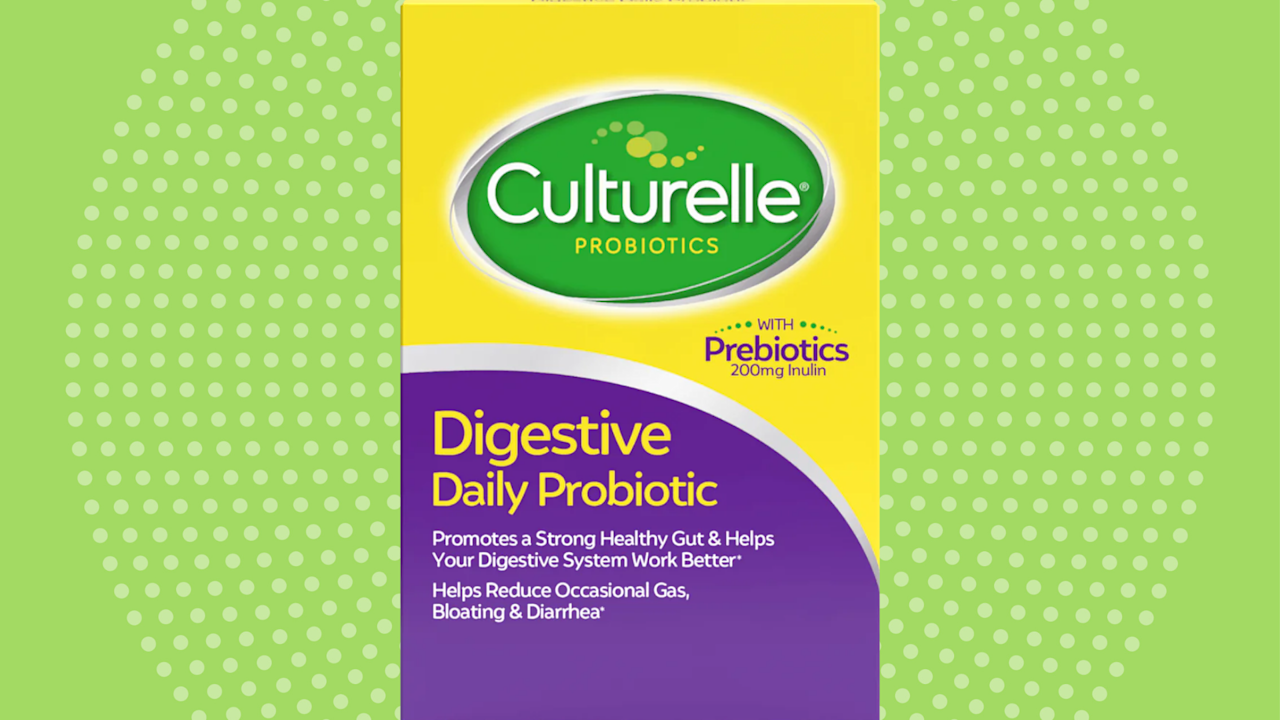
Culturelle
Best drugstore probiotic
Culturelle Digestive Daily Probiotic Capsules
Form: Capsule | Dose: 1 capsule | CFU count: 10 billion | Strains: Lactobacillus rhamnosus GG
When it comes to probiotics, Culturelle is one of the best-known and easiest-to-find brands out there. Culturelle Digestive Daily Probiotic Capsules is an affordable probiotic supplement that's available at most drugstores, big box stores or online. This daily probiotic contains L. rhamnosus GG, a probiotic strain with ample research supporting its GI and immune benefits.
The first studies on L. rhamnosus GG date back to clinical trials in 1987. Since then, the strain has been used in more than 300 human research studies. In addition to helping with occasional digestive issues, like gas or bloating, the strain has also been shown to be effective for preventing or managing traveler's diarrhea and antibiotic-associated diarrhea.
Culturelle Digestive Daily Probiotic is vegan-friendly and features a simple ingredient list free from artificial dyes, preservatives, dairy, lactose, milk, yeast, wheat, eggs, tree nuts, peanuts, gluten and soy. Servings are individually sealed in blister packs, and there's no need for refrigeration.
The capsules are easy to swallow and use. I've used them for a few weeks with positive results when I felt my gut needed a little extra TLC. One reviewer says she "had an upset stomach with bloating and cramping from antibiotics and [the supplement] helped tremendously. I felt back on track much faster than usual and was able to digest my food better. [The capsules are] not harsh at all and easy to swallow. I’d recommend this over other probiotics I’ve tried in the past."
It's important to note that each capsule contains 200 mg of inulin, a prebiotic fiber that supports beneficial gut bacteria. While generally easy to tolerate, inulin can cause gas or bloating in some individuals.
ProsWide availabilityAffordableTrusted brandResearch-backed probiotic strainGood for general gut healthMay be helpful for traveler's or antibiotic-associated diarrheaShelf-stableConsContains inulin, which may cause GI side effects in someOnly one strain of probiotics$18 at CulturelleExplore More Buying Options$18 at Target$17 at Amazon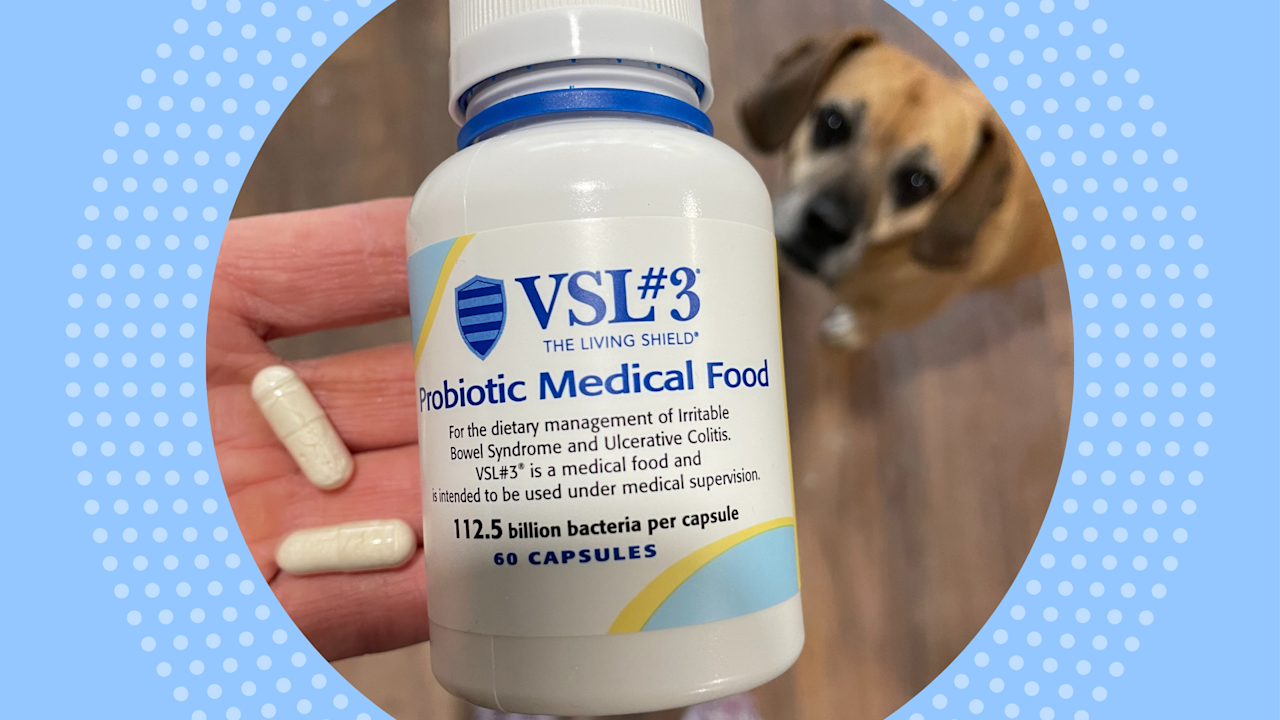
Alexandra Ginos, RD
Best probiotic for IBS
VSL#3 Capsules
Form: Capsule | Dose: 1 capsule up to 4 times per day | CFU count: 112.5 billion per capsule | Strains: Streptococcus thermophilus, Bifidobacterium breve, Bifidobacterium lactis (previously classified as B. longum), Bifidobacterium lactis (previously classified as B. infantis), Lactobacillus acidophilus, Lactobacillus plantarum, Lactobacillus paracasei, Lactobacillus helveticus
VSL#3 is our pick as the best probiotic for IBS thanks to its high potency, multistrain formulation and robust clinical backing for people with digestive conditions, including irritable bowel syndrome (IBS). Each capsule delivers 112.5 billion CFU from eight different probiotic strains. This high concentration and variety are designed to promote a varied and balanced microbiome for overall gut health.
VSL#3 has been extensively studied for its therapeutic benefits, particularly in managing gastrointestinal disorders, including irritable bowel disease (IBD) and IBS. For example, one study found VSL#3 significantly reduced abdominal pain and strengthened gut lining in adults with IBS after four or eight weeks of regular use.
Koenig also emphasizes that VSL#3 is unparalleled in the probiotic market, highlighting its specific formulation tailored for IBS, ulcerative colitis and fatty liver disease. She says that other products may lack the precise strains or concentrations necessary for therapeutic efficacy.
VSL#3 is classified as a probiotic medical food, intended for use under medical supervision. It requires refrigeration to maintain the viability of its live bacterial strains, and the product is shipped with freezer packs to ensure potency upon arrival. The labeled CFU count is guaranteed until expiration when stored as directed to ensure quality and effectiveness.
During testing, I found the capsules easy to swallow, though the recommended intake of up to four capsules may be a deal breaker for some. The product is also available in powder form if preferred. While VSL#3 is priced at a premium, subscription options and multipack purchases help make it more affordable.
ProsBacked by extensive clinical researchProvides a potent dose of probioticsContains eight strains of probioticsCFU count guaranteed until expiration if stored properlyPowdered form availableConsExpensiveRequires refrigerationRecommended dose of up to four capsules daily$66 at VSL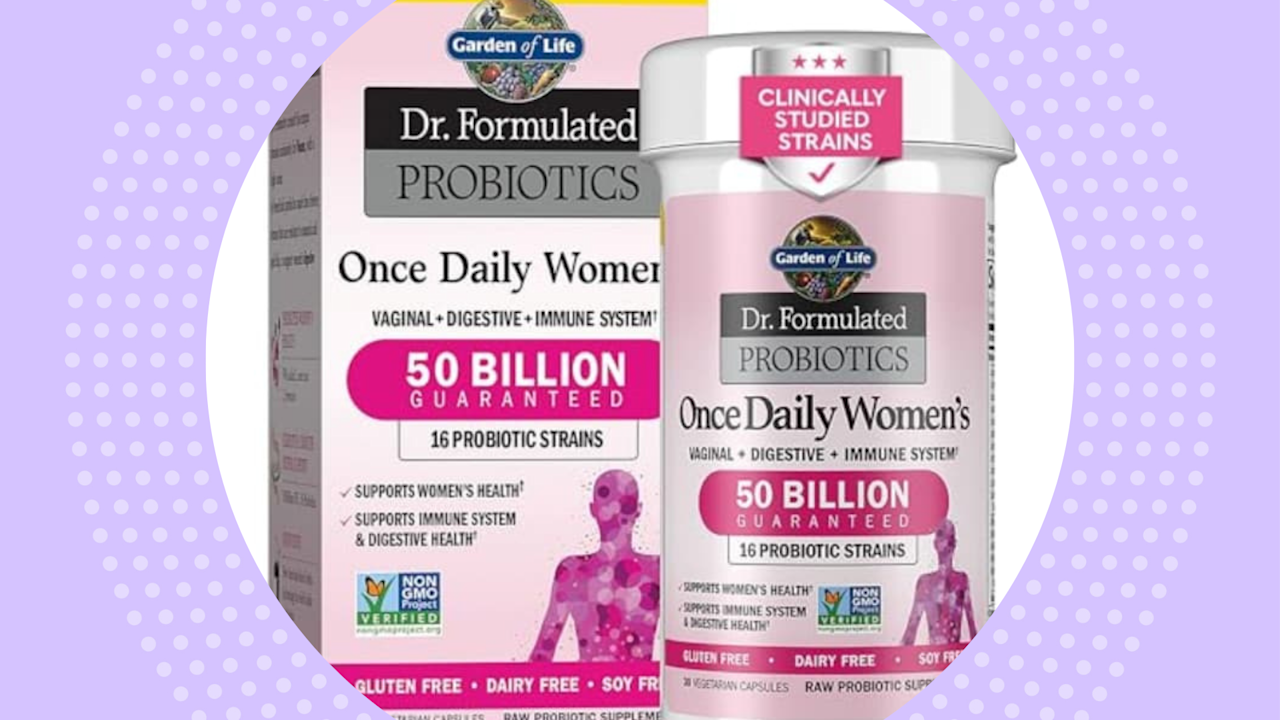
Garden of Life
Best probiotic for women
Garden of Life Once Daily Dr. Formulated Probiotics for Women
Form: Capsule | Dose: 1 capsule | CFU count: 50 billion | Strains: Lactobacillus acidophilus, Lactobacillus plantarum, Lactobacillus casei, Lactobacillus paracasei, Lactobacillus bulgaricus, Lactobacillus brevis, Lactobacillus reuteri, Lactobacillus salivarius, Lactobacillus fermentum, Lactobacillus gasseri, Lactobacillus rhamnosus, Bifidobacterium lactis, Bifidobacterium bifidum, Bifidobacterium breve, Bifidobacterium infantis, Bifidobacterium longum
Garden of Life Once Daily Dr. Formulated Probiotics for Women is a well-rounded, easy-to-take probiotic that's formulated with women's health in mind. Each one-capsule-size serving delivers 16 different probiotic strains, including L. acidophilus and B. lactis, which are known to support general gut health.
The supplement also offers female-specific benefits thanks to the inclusion of L. reuteri and L. fermentum. These strains are among several that have been shown to help maintain a healthy vaginal microbiome (yes, your gut isn't the only place where these beneficial microorganisms reside) and may even help manage or reduce the rate of recurrence of common issues like urinary tract infections (UTIs) and yeast infections.
According to our tester, who has tried several women's probiotics in the past, this one stood out as one of her favorites. She appreciated that it supports both general and vaginal health, whereas many other products tend to focus on just one. Despite the capsules' intimidating size, she found them easy to swallow and experienced no unwanted digestive side effects. Combined with a few dietary changes, she was pleased to report that after several months of regular use, she had fewer recurring yeast infections while taking the product.
Garden of Life Once Daily Dr. Formulated Probiotics for Women has nearly 3,000 five-star reviews on Amazon. One reviewer calls it "A probiotic that actually does something," adding, "I've been using the Garden of Life Once Daily Probiotics for Women for about five months now, and I can honestly say it's made a real difference." In addition to helping with PMS symptoms, joint pain and mood swings, the reviewer says it's been key for vaginal support too, noting, "Since I started taking it, I haven't had any problems with odor, discharge or infections. I know everyone's different, and some might prefer other strains like L. crispatus or L. jensenii, but this probiotic has been reliable for me."
ProsIncludes strains to support vaginal healthNSF-certified gluten-freeThird-party tested for purity and potencyOne-a-day formulationEasy to swallow despite large capsule sizeShelf-stableConsLarge capsule sizeDoesn't include some strains that are also linked with vaginal health$32 at AmazonExplore More Buying Options$26 at Target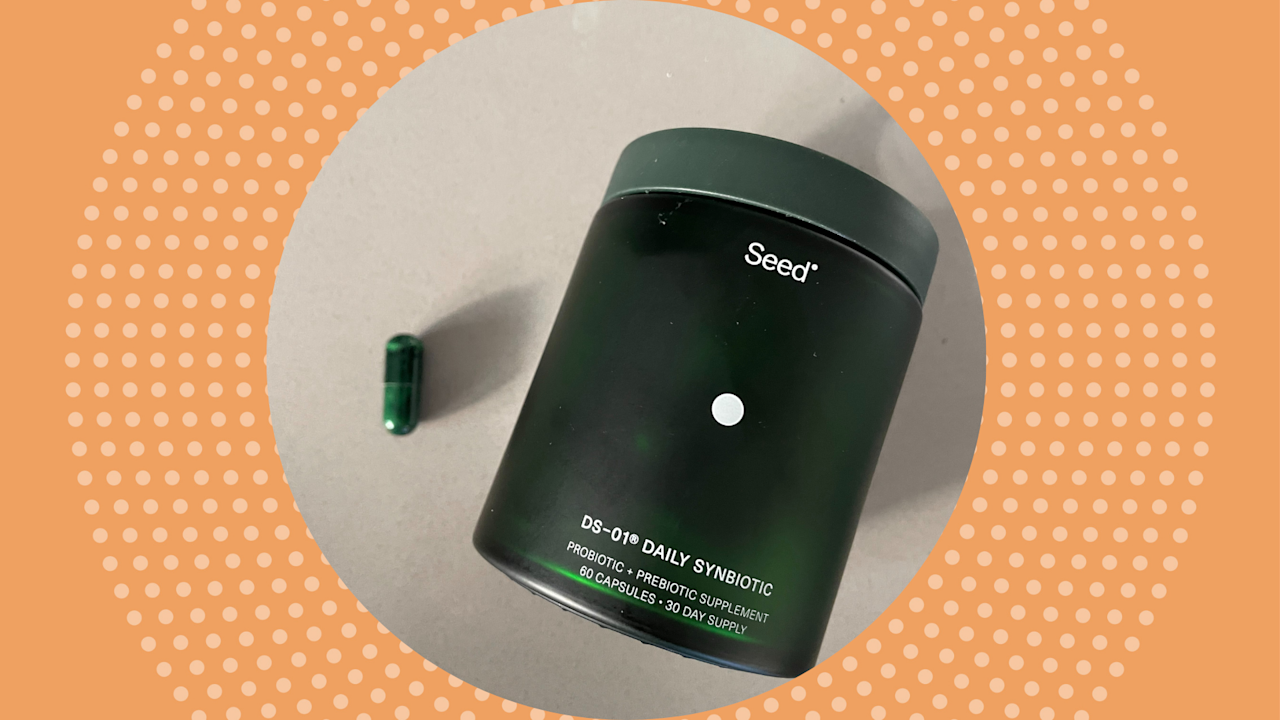
Alexandra Ginos, RD
Best pre- and probiotic
Seed DS-01 Daily Synbiotic
Form: Capsule | Dose: 2 capsules | AFU count: 53.6 billion | Strains: Bifidobacterium longum SD-BB536-JP, Bifidobacterium breve SD-BR3-IT, Lactiplantibacillus plantarum SD-LP1-IT, Lacticaseibacillus rhamnosus SD-LR6-IT, Lacticaseibacillus rhamnosus HRVD113-US, Bifidobacterium infantis SD-M63-JP, Bifidobacterium lactis SD-BS5-IT, Bifidobacterium lactis HRVD524-US, Lactobacillus crispatus SD-LCR01-IT, Lacticaseibacillus casei HRVD300-US, Bifidobacterium breve HRVD521-US, Bifidobacterium longum HRVD90b-US, Bifidobacterium lactis SD150-BE, Limosilactobacillus fermentum SD-LF8-IT, Lacticaseibacillus rhamnosus SD-GG-BE, Limosilactobacillus reuteri RD830-FR, Ligilactobacillus salivarius SD-LS1-IT, Bifidobacterium lactis SD-CECT8145-SP, Bifidobacterium longum SD-CECT7347-SP, Lacticaseibacillus casei SD-CECT9104-SP, Lactiplantibacillus plantarum SD-LPLDL-UK, Bifidobacterium lactis SD-MB2409-IT, Bifidobacterium adolescentis SD-BA5-IT, SD-LRE2-IT
When it comes to supporting gut health, probiotics often hog the spotlight. However, prebiotics are just as important for fostering a diverse and thriving gut microbiome. Prebiotics promote the growth of beneficial gut bacteria and can be found in a variety of plant-based foods, including fruits, vegetables and legumes. They can also be found in supplement form, including this synbiotic.
If you prefer a supplement that provides both pre- and probiotics, Seed DS-01 Daily Synbiotic is a solid choice. Each two-capsule serving delivers 53.6 billion active fluorescent units (AFU) from 24 clinically backed probiotic strains, accompanied by prebiotic fibers that nourish beneficial gut bacteria. It also features an innovative nested capsule design intended to enhance the survivability of probiotics through the digestive tract, ensuring they reach the intestines.
To ensure quality, potency and viability, Seed DS-01 is third-party tested and undergoes more than 50 quality assurance and quality control checkpoints.
Seed's packaging feels premium. The initial shipment includes a durable, refillable glass jar and a travel-friendly glass vial that are both functional and eco-conscious. While the capsules are quite large, many users, including myself, find them easy to swallow.
One thing to note is Seed uses AFU rather than CFU to measure the viable and culturable probiotic cells per dose. Studies suggest that AFU may be more accurate because it measures all viable cells, even ones that may not be culturable.
While reviewers note that the product isn't cheap, many find Seed's quality worth the splurge. According to one five-star reviewer, "This is the first probiotic I've taken that has actually made me feel different! I was so bloated, and foods that I normally eat were upsetting my stomach. After about 2 weeks, my sensitivity lessened and my bloating is minimal to mostly gone."
ProsContains 24 clinically backed probiotic strainsIncludes prebiotic fiberThird-party tested for purity and potencyVegan-friendlyReusable, eco-friendly packagingConsPremium pricingLarge capsule sizeSome people report GI side effects after several weeks of use$50 at SeedExplore More Buying Options$60 at Target$54 at Amazon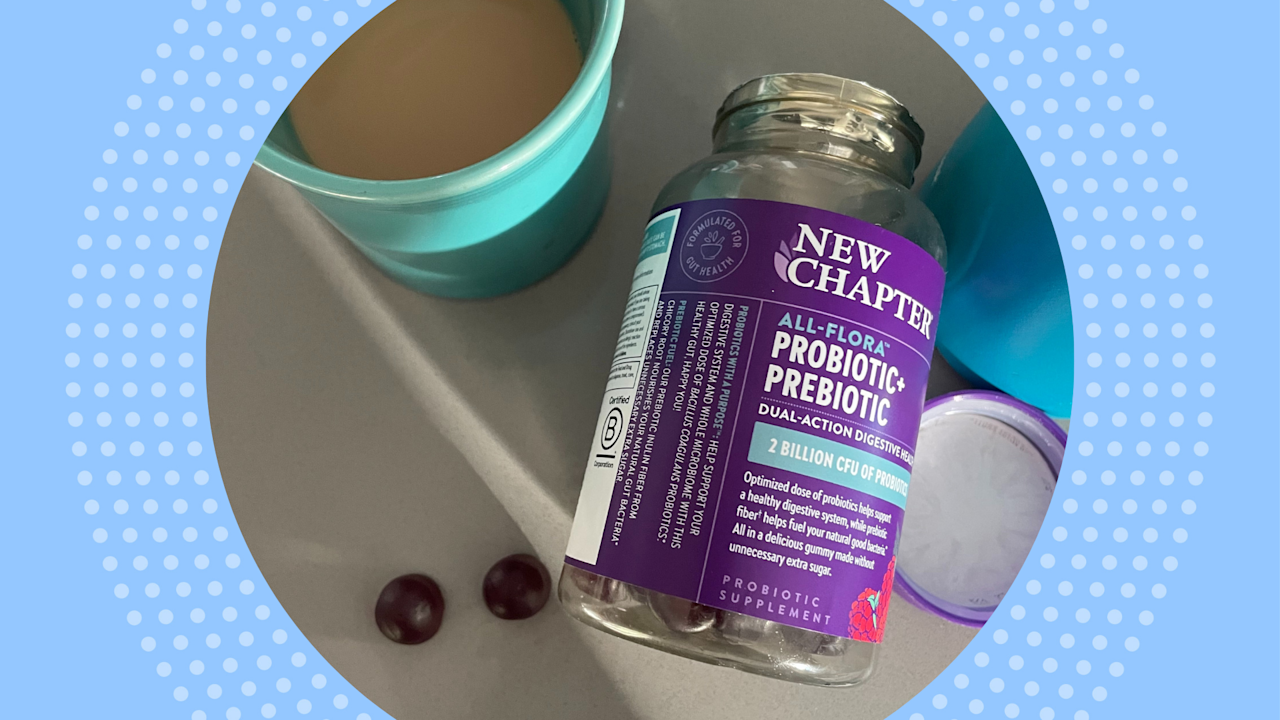
Alexandra Ginos, RD
Best probiotic gummies
New Chapter All-Flora Probiotic + Prebiotic Gummies
Form: Gummy | Dose: 2 gummies | Strains: Bacillus coagulans | CFU count: 2 billion
If you dislike taking pills or capsules, New Chapter All-Flora Probiotic + Prebiotic Gummies should be on your radar. Each two-gummy serving contains 3 grams of prebiotic fiber and 2 billion CFU of B. coagulans, a well-researched probiotic strain with benefits for gut and immune health.
These gummies have a delicious berry taste and pleasantly chewy texture, reminding me of a fruit snack, though they contain only 1 gram of added sugar per serving. In addition, they're non-GMO verified, vegan-friendly, gluten-free and naturally colored from organic maqui berries.
The supplement is well-reviewed online, with happy customers praising it for its enjoyable taste and ease of use. One reviewer notes that the product has helped alleviate digestive issues, saying, "I have noticed a definite change with my stomach problems. It has made me feel more regular and less bloated."
ProsPleasant berry tasteOnly 1 g of added sugar per servingIncludes prebioticsThird-party tested for purity and potencyVegan-friendlyConsOnly one probiotic strainGummies may clump together in the bottle$24 at New ChapterExplore More Buying Options$24 at Amazon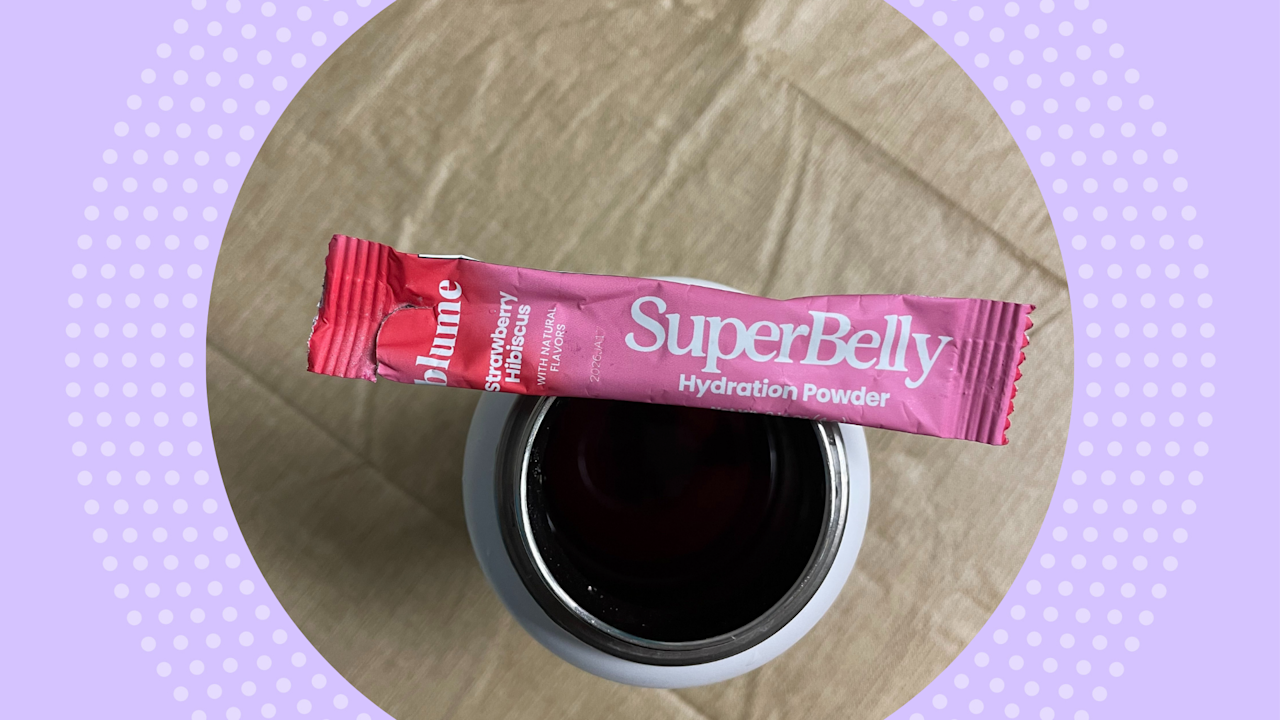
Alexandra Ginos, RD
Best powder probiotic
Blume SuperBelly
Form: Powder | Dose: 1 packet | Strains: Bacillus coagulans GBI-30 6086 | CFU count: 1 billion
If you prefer a probiotic supplement you can drink, Blume SuperBelly Gut-Building Hydration Powder is an excellent choice. Packaged in convenient single-serving packets, it's perfect for travel — just mix with water for a flavorful probiotic boost. Each SuperBelly packet delivers 1 billion CFU of B. coagulans, a shelf-stable probiotic with research-backed benefits for gut and immune health.
This powdered supplement is available in three subtle but delicious flavors — Strawberry Hibiscus, Lemon Ginger and Açai Pomegranate — and uses natural ingredients like beetroot, carrot, blueberry juice, pink Himalayan salt and hibiscus to achieve its taste and color. It's also organic, gluten-free, dairy-free and plant-based, with no added sugar or artificial colors. Each packet contains 10 calories and 1 gram of prebiotic fiber, making it a healthy addition to your daily routine.
Amazon reviewers also enjoy this drink mix, with one saying, "This stuff is amazing. It feels like a special treat when I drink it every day! It helps me feel energetic and not bloated."
During testing, I found all three flavors enjoyable and didn't detect any lingering aftertaste. That said, if you strongly dislike stevia, this might not be the product for you.
ProsConvenient alternative to capsulesAvailable in three tasty flavorsOrganic and vegan-friendlyNo artificial flavors or colorsNo added sugarConsExpensiveOnly one probiotic strainContains stevia, whose aftertaste is unpleasant to some.$32 at BlumeExplore More Buying Options$32 at Target$32 at Amazon(back to top)
Types of probiotic supplements
Probiotic supplements are available in various forms, strains and strengths. Here are some common types:
AdvertisementAdvertisement#«R4rekkr8lb2m7nfblbH1» iframeCapsules: A popular choice, and for good reason. Liz McMahon, MPH, an IBS and gut health registered dietitian, primarily recommends capsules, explaining "probiotics may not do much if they can't make it past your stomach acid, so ensuring that the product is encapsulated is important." Probiotic capsules can be single- or multistrain, and some are designed to be taken on an empty stomach.
Gummies: Favored for their taste and ease of consumption, gummies are a good alternative for people who dislike swallowing pills. However, they may contain added sugars and have lower probiotic counts than other forms.
Powders: These can be mixed into water, smoothies or other beverages, offering flexibility in consumption. They may also allow for higher doses of probiotics and can be free from certain additives found in other forms.
Drinks: Probiotic beverages provide hydration along with probiotics. They can be a tasty way to incorporate probiotics into your diet but may require refrigeration and have shorter shelf lives. Additionally, depending on the product, they might not contain a therapeutic dose of probiotics.
Drops: Often used for infants or individuals who need a precise dosage, probiotic drops can be added to food or taken directly. They are typically free from additives and are easy to administer.
Synbiotic blends: These combine probiotics with prebiotics — fibers that feed beneficial bacteria. Some synbiotics also include postbiotics, which are bioactive compounds created by probiotics.
Combination supplements: Some products include probiotics along with vitamins, minerals or other active ingredients, aiming to provide multiple health benefits in a single supplement. While convenient, they can cause excessive nutrient intake if you're already taking other dietary supplements.
(back to top)
Factors to consider when purchasing probiotic supplements
Before spending your hard-earned cash on a probiotic, you'll want to consider several factors to ensure you choose a product that's right for you. Here are key considerations to keep in mind:
Strain diversity and specific strains
The most common probiotics found in supplements are from the groups Lactobacillus and Bifidobacterium. Some supplements also contain S. boulardii, which is a beneficial yeast. Certain strains of probiotics have specific benefits. For example, L. rhamnosus GG and S.boulardii may help reduce the risk of antibiotic-associated diarrhea.
AdvertisementAdvertisement#«R52ekkr8lb2m7nfblbH1» iframeFor general gut health, "I look for Lactobacillus, Bifidobacterium and S. boulardii in supplements," says McMahon. While multistrain probiotic supplements may offer a wider range of health benefits, single-strain products can be a better option, depending on the strain and your health needs. When recommending products to clients, McMahon says that it ultimately depends on the "strain, dose and CFU amount for a particular condition."
Colony forming units (CFU)
The most common measurement for probiotics is colony forming units (CFU). This measurement indicates the number of viable cells in a probiotic supplement. Common doses are between 1 to 10 billion CFU, but higher doses don't necessarily mean greater health benefits.
Shelf stability or storage requirements
When selecting a probiotic supplement, it's essential to consider its storage requirements. Some probiotics are shelf-stable and can be stored at room temperature, while others require refrigeration. If a supplement that needs refrigeration is left out, the live beneficial bacteria may lose viability, reducing the product's effectiveness.
3rd-party testing
When shopping for dietary supplements, it's best to choose products that are third-party tested to ensure they contain the types and amounts of ingredients listed on the label. Examples of reputable third-party organizations include the U.S. Pharmacopeia (USP) and the National Sanitation Foundation (NSF).
Prebiotic inclusion
Prebiotics are fibers that get broken down and fermented by gut bacteria, resulting in byproducts that are essential for your health. Because of how they work together to support gut health, supplements that contain both probiotics and prebiotics are often referred to as synbiotics.
AdvertisementAdvertisement#«R5cekkr8lb2m7nfblbH1» iframeShould you opt for a synbiotic over a prebiotic? It depends. According to McMahon, "Some prebiotics contribute to GI issues like gas and bloating, so I prefer to dose them separately." Koenig, on the other hand, says that she's found synbiotics helpful for some of her clients. "There is research showing some prebiotics, which are fibers that feed gut bacteria, can help with digestive function and can reduce cravings. I've been recommending these to my clients," she says. She further explains that early research shows that prebiotics and probiotics together "[might] increase our natural production of GLP-1 hormone. I predict it will be the next big area of supplements!"
Allergen info
If you have food allergies or intolerances, read supplement labels carefully and consider purchasing a supplement that's manufactured in an allergen-free facility.
Value
Probiotic supplements range in price, from cheaper drugstore options to pricier brands available only online or through a subscription. New to probiotics? A less expensive product might be the best way to go. According to Smolen, "If an individual is just starting out taking a probiotic, I would recommend a drugstore brand. This is to evaluate if a probiotic would be beneficial to add to their supplement routine." McMahon agrees with trying drugstore brands, saying, "I recommend Florastor, Align and Culturelle all the time. They have the strains I'm looking for, you can find them anywhere, they're cost-effective and well-studied." However, she sometimes recommends the more expensive brands, like Seed or VSL#3, "for their robust research, but not everyone can afford to do that monthly," she says.
(back to top)
How we chose the best probiotic supplements
To select the best dietary probiotic supplements, we first consulted three registered dietitians specializing in digestive and gut health to understand the factors they consider when recommending probiotics to their clients. Using their guidance and my expertise as a registered dietitian, I reviewed the most popular brands on the market and narrowed the testing pool down to 15 supplements. During testing, I assessed each product based on its formulation, storage requirements, ease of use, flavor profiles, side effects and changes in gut health.
AdvertisementAdvertisement#«R5lekkr8lb2m7nfblbH1» iframe(back to top)
Other products we tested
Beyond our top picks, we explored a wide range of probiotic supplements. Some came close to making the cut with research-backed strains and ease of swallowing, while others fizzled out due to high price tags or lack of quality assurance. Here's a quick look at the other contenders:
Align Probiotic Extra Strength: Regularly feeling like you need to unbutton your jeans after eating? Align Probiotic Extra Strength might help. This shelf-stable probiotic delivers 5 billion CFU from B. longum 35624. This strain has been shown to reduce symptoms in people with IBS — especially bloating — however, its effectiveness hasn't been replicated in those without IBS. Our tester (who has IBS) vouched for the supplement's effectiveness, saying it helped improve bloating and constipation after about a week of daily use.
Solaray Mycrobiome Probiotic Urgent Care: With each capsule delivering 100 billion CFU from 24 diverse probiotic strains, this supplement is worth considering if you've been recommended to take a high-dose probiotic. The capsules feature an enteric shield for optimal effectiveness and are lab-verified to ensure potency and purity. Potential downsides? The supplement is expensive and requires refrigeration. Plus, the high CFU count isn't necessary for everyone.
Bio.me Synbiotic: Similar to Seed, this supplement stands out for its inclusion of pre-, pro- and postbiotics. The capsules are transparent, allowing you to see the powder inside — a feature I appreciated for its sense of quality. I was also impressed by the resealable pouch, which helps reduce plastic waste. Ultimately, Seed's rigorous testing standards earned it our pick as the best pre- and probiotic, but Bio.me Synbiotic was a close runner-up.
Cielo Horizon: This multistrain probiotic is unique in that it contains digestive enzymes — proteins that facilitate the breakdown of food into absorbable nutrients. While they may be helpful for people with enzyme deficiencies or certain digestive conditions, digestive enzyme supplements aren't appropriate for everyone. Additionally, this supplement contains herbal extracts that may interact with certain medications.
Shaklee Good Gut & Go: This convenient probiotic drink stick contains 10 billion CFU from three different probiotic strains. It also includes 3 grams of prebiotic fiber per serving and is easy to use — pour into a glass of water and mix. While I appreciated the convenience of this product, the raspberry flavor wasn't my favorite.
Bowmar Nutrition One Daily Probiotics: I appreciated the overall formulation of this once-daily probiotic and found the capsules easy to swallow. However, the product's lack of quality assurances, like third-party testing, was a major downside.
Beautycore: Beautycore is a probiotic supplement for women formulated to help improve skin, hair and gut health. The product includes fermented vitamins, like biotin, and four clinically backed probiotic strains. That said, while researching Beautycore, I couldn't find research to support its claims for skin health. Its high price point and limited availability also made it hard to justify recommending it over others on our list.
LTH Balance Multi Pro 30B Probiotic: This probiotic from Lifetime Fitness contains six probiotic strains and 30 billion CFU. It's NSF-certified and easy to use, with only one capsule needed per day. While it's certainly a good-quality product, I liked the formulations of other products I tried better.
(back to top)
FAQs
How long does it take for probiotics to work?
Every body is different. In generally, it can take anywhere between a few days to a few months to notice effects.
AdvertisementAdvertisement#«R5uekkr8lb2m7nfblbH1» iframeHow long it can take to see results after taking a probiotic supplement depends on the product you're taking — including the strains and dose provided — as well as your diet, gut health and reasons for taking a probiotic.
Should I take probiotics with food?
Whether to take probiotics with food varies by product, so it's best to follow the directions on the supplement label. Some probiotic supplements recommend taking them on an empty stomach, while others encourage taking your daily dose with a meal. Ultimately, what's most important is to take probiotics consistently.
Are there any side effects of taking probiotics?
For generally healthy adults, probiotic side effects are usually minimal. That said, mild GI side effects are possible, especially during the initial few days of taking a new probiotic. Side effects may include bloating, gas, nausea and diarrhea. For people who have severe illnesses or are immunocompromised, probiotics could have more harmful effects. Always talk with a health care professional before adding any new supplement to your wellness routine.
Do I need to refrigerate my probiotic supplements?
Some probiotics require refrigeration to maintain viability. Read the product label carefully to see if your probiotic needs to be refrigerated or if it's OK to store at room temperature.
Can I take probiotics with antibiotics?
Yes, it's generally safe to take probiotics while you take antibiotics. In fact, some brands of probiotics have studied strains that help minimize GI side effects while taking these medications. Still, if you have any doubts about medication interactions, it's best to talk with your health care provider.
What is the best probiotic to take with antibiotics?
Lactobacillus rhamnosus GG and Saccharomyces boulardii are two strains of probiotics that have the most research to support their effectiveness for maintaining gut health while taking antibiotics. Culturelle Digestive Daily, our pick for the "best drugstore probiotic," is a good option, as it contains L. rhamnosus GG. That said, it's best to talk with your doctor or other health care professional for specific advice on which probiotic supplement to take.
What probiotic is best for constipation?
Look for products containing B. lactis, L. rhamnosus GG or L. casei Shirota, as they have the most research to support their effectiveness. Some research suggests that synbiotics containing one of these probiotics along with inulin, may be most effective for managing chronic constipation.
What probiotic is best for men?
Despite many "men's" formulations on the market, research on probiotics for men is lacking. While there's some discussion around certain strains being helpful for supporting declining testosterone levels, studies haven't found a significant benefit. Similarly, test-tube studies suggest there may be a link between gut health and prostate health, but these results haven't been confirmed in humans.
AdvertisementAdvertisement#«R6eekkr8lb2m7nfblbH1» iframe(back to top)
Meet our experts
Vicki Koenig, MS, RD, CDN, a media registered dietitian at Nutrition-Wise
Liz McMahon, MPH, RDN, a gut health dietitian
Alyssa Smolen, MS, RDN, CDN, a community and media dietitian
(back to top)
Our health content is for informational purposes only and is not intended as professional medical advice. Consult a medical professional on questions about your health.





